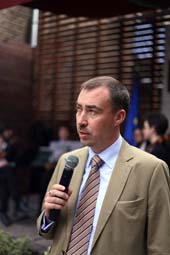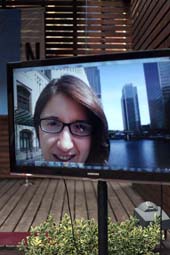
Journalism competition kicks-off on World Press Freedom Day
By Salome Modebadze
Monday, May 19
Do you work in print, online, radio or TV media? If yes, you have a unique opportunity to win 3,500 GEL with the third EU Prize for Journalism, which officially kicked-off on the on May 6. Moreover, the winner of the EUMM Peace Prize will be offered a special fellowship to participate in the Caucasus program at the headquarters of the Institute of War & Peace Reporting in London.
If you have stories in English, Georgian, Russian, Abkhazian or Ossetian released from October 10, 2013 to October 31, 2014, you can submit them either to the EU Prize for Journalism or the EUMM Peace Prize.
Opening the ceremony at the Folks Garden in Tbilisi, the Head of the European Union Delegation to Georgia, Philip Dimitrov, said he had always been amazed by the “intensity” and “ambitions” of Georgian journalists.
“[We] cannot make everybody happy, cannot be loved by everybody, cannot be at the heart of everybody…” Dimitrov said, stressing that a person can defend their own values even when other people are attacking them and remain fair, meaning telling the truth to the extent to which you can address it.
Dimitrov hoped that the tendency of writing “good pieces of journalism” will continue in Georgia. He said this is why the EU Prize for Journalism exists as a stimulus to become better.
It was in 2013 when the European Union Monitoring Mission (EUMM) established the special prize for peace journalism.
The Head of the EUMM in Georgia Toivo Klaar said peace journalism is journalism that overcomes and eliminates biases, showing all perspectives of the story and tries to unite understanding rather then divide.
“This is what we do in the EUMM as well,” Klaar said.
The EUMM is an incident prevention response mechanism along the administrative border dividing Georgia’s mainland from its separatist controlled regions across Georgia aimed at preventing conflicts from arising.
“And that aspect of resolving [and] explaining different points of view is what peace journalism is very much about,” the Head of EUMM said.
In a special video clip sent from London, the winner of last year’s peace prize Olesya Vartanyan shared her impressions with the future competitors.
IWPR’s Beka Bajelidze promised that the new winner would also have great opportunities for professional development.
The Executive Director at the Georgian Charter of Journalistic Ethics Tamar Rukhadze who was a member of last year’s journalism competition, said this is a very important initiative for Georgia – a country with ongoing conflicts. She said this is the way journalists can show the joint sorrow and happiness of people across the conflict zone by focusing on the details of their everyday life. Rukhadze said this is how they can reveal the human stories, which are often forgotten during political or diplomatic talks.
For detailed information about the project, please visit: http://www.euprizejournalism.ge



